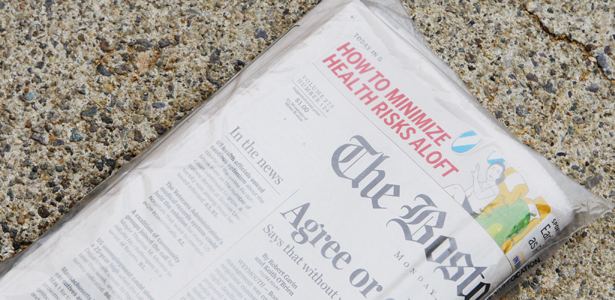Can a Paywall Stop Newspaper Subscribers From Canceling?

Today the Boston Globe launched a new site, and unlike at its old home at Boston.com, visitors to BostonGlobe.com will have to pay a fee to get behind the site's paywall and read the newspaper's stories.
But make no mistake: This paywall is about more than making money off the web. This is about making money from old-fashioned newsprint.
How so? Designed much like the New York Times' paywall (the two papers are owned by the same parent company) access to the Globe's site costs more than a subscription to its print paper. But, and this is the big but, print subscribers get free access to all digital content. Here are the numbers: For $3.99 a week, you can get access to BostonGlobe.com. But for $3.50 a week, you can get a Sunday paper and access to the website. The New York Times' plan looks similar. For the most minimal digital access (iPad app not allowed), readers can pay $3.75. Or, you can pay the same amount, get the Sunday paper, and get complete digital access (including for your iPad), which costs $8.75 a week without a subscription.
In other words, for what amounts a discount, people can get full online access and then a free printed paper.
This is a good deal for the papers because their primary goal isn't to get more money from the web: it's to staunch the bleeding of subscribers they've faced ever since people started getting news online, and maybe (hopefully) pick up even more paper subscribers. And paper subscribers mean more money for the newspaper, since advertising revenues per revenue are much greater for print than on the web. And advertising -- not subscriptions -- is where the real money lies.
In the coming months, the real test for the New York Times' and the Globe's paywalls won't be how many people they managed to find to pay for online access -- it's how their paper subscription rates have fared. So far, the early data from the New York Times (whose paywall began in March) shows that cancellations to the print version had declined and there was a small uptick in new print subscribers.
I know it worked for me. I've been getting a Sunday paper ever since the Times's paywall went up. But for those of you out there that really can't bear to have one more piece of paper in your house, Harvard's Nieman Lab has a nice solution: Subscribe from the address of a library or a community center. They'll appreciate the paper edition, and you can laugh all the way to the website.
Image: Reuters.